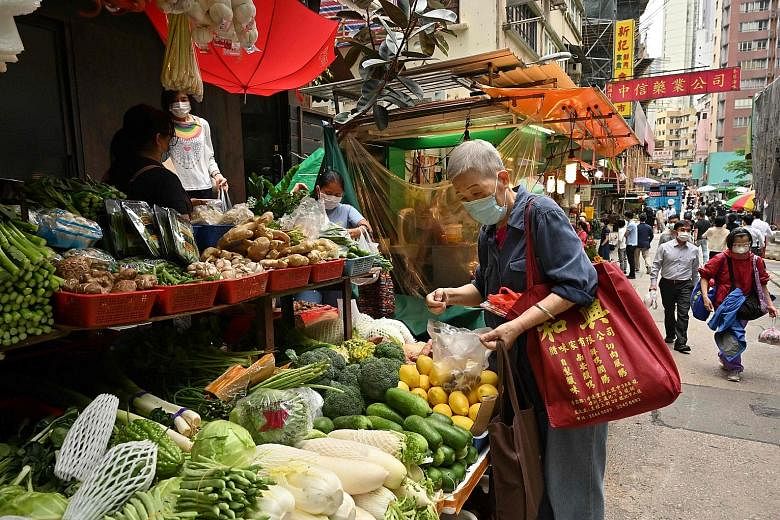It took Mr In Chung Sik's two daughters five months to persuade their father to get vaccinated against Covid-19.
The 72-year-old semi-retired consultant, who was slated to receive his second dose of the BioNTech jab yesterday, was initially afraid of going through with inoculation, as he has blood clots and diabetes.
"When the vaccination drive was first rolled out, there were reports of people who had side effects and had to be hospitalised. So I had less confidence," said Mr In.
But his daughters urged him to go for a health check to confirm that he could be safely vaccinated.
"I decided I would take the BioNTech vaccine after hearing that it was effective. Also, my daughters pushed for me to get vaccinated as soon as possible," he said, adding that his doctor's evaluation tipped the scales.
"I consulted a doctor who said it was okay to get the jabs."
Despite clocking a month-long zero-infection record, Hong Kong's road to reopening its borders is fraught with obstacles as vaccination rates, particularly for seniors, remain painfully low.
Of the 2.9 million residents who have had their first shot of either the Sinovac or BioNTech vaccine - the only two offered in Hong Kong - just 4.4 per cent are in their seventies and only 1 per cent are 80 and above.
On Sunday, Secretary for the Civil Service Patrick Nip, who oversees the city's Covid-19 vaccination drive, said that fewer than a quarter of people older than 65 have been inoculated.
Since the vaccination drive began at the end of February, 39 per cent of the 7½ million population have had a first shot and 28 per cent have had two jabs.
These figures are low compared with other places such as the United States, where half of the population are fully vaccinated.
In Britain, more than six in 10 individuals aged 18 and above are fully vaccinated, while in the Chinese mainland, more than 1.4 billion doses of vaccines have been administered, covering about half of the population of 1.4 billion.
In Singapore, half of the 5.7 million population are fully inoculated, despite having 200,000 seniors above the age of 60 who are still unvaccinated.
Health experts in Hong Kong have cautioned that people in vulnerable age groups need to get inoculated for the city to have the fundamentals to reopen borders.
Dr Leung Chi Chiu of the Hong Kong Medical Association noted that the slow vaccine take-up among the elderly has pitfalls, including possible small outbreaks in care homes or hospitals, and is also hindering the city's vaccination drive.
He said that seniors often have multiple comorbidities and a high rate of sudden cardiovascular or other untoward events.
Some initial reports of deaths in eldercare homes abroad after early use of mRNA vaccines, as well as subsequent coincidental cardiovascular events in Hong Kong after the roll-out of Sinovac's inactivated vaccine, caused widespread concern in the city's community.
At that time, the inactivated vaccine was not officially rolled out in the mainland for those aged 60 and above, said Dr Leung.
"We apparently failed to clarify such misunderstandings at the earliest stage. Instead, a medical check-up before vaccination was suggested, without giving a clear list of the limited number of specific clinical scenarios where vaccination needs to be deferred," said the respiratory doctor.
This could explain why Hong Kong's seniors lost enthusiasm for signing up for the jabs.
Cultural concerns over the adverse effects of Western medicine could also have contributed to this, Dr Leung said.
Previously, Elderly Commission chairman Lam Ching Choi was reported to have said that the government was considering vaccinating care home residents who did not have family members. This group accounts for about 40 per cent of those in care homes.
The more aggressive approach came after vaccination guidelines from the joint scientific committee under the Centre for Health Protection were revised last month to state that any senior who previously took flu vaccines can safely receive Covid-19 shots.
Now, the government is considering accepting walk-ins at vaccination centres - similar to what Singapore is doing - to encourage seniors to get their jabs and make it easier for them to do so.
Dr Leung said a major vaccination campaign targeting the elderly, including those in care homes, is "long overdue".
"During such a campaign, we need to spell out clearly the few scenarios when vaccination needs to be deferred and coordinate all professionals and the whole community to encourage all eligible elderly to take either of the two available vaccines now."


